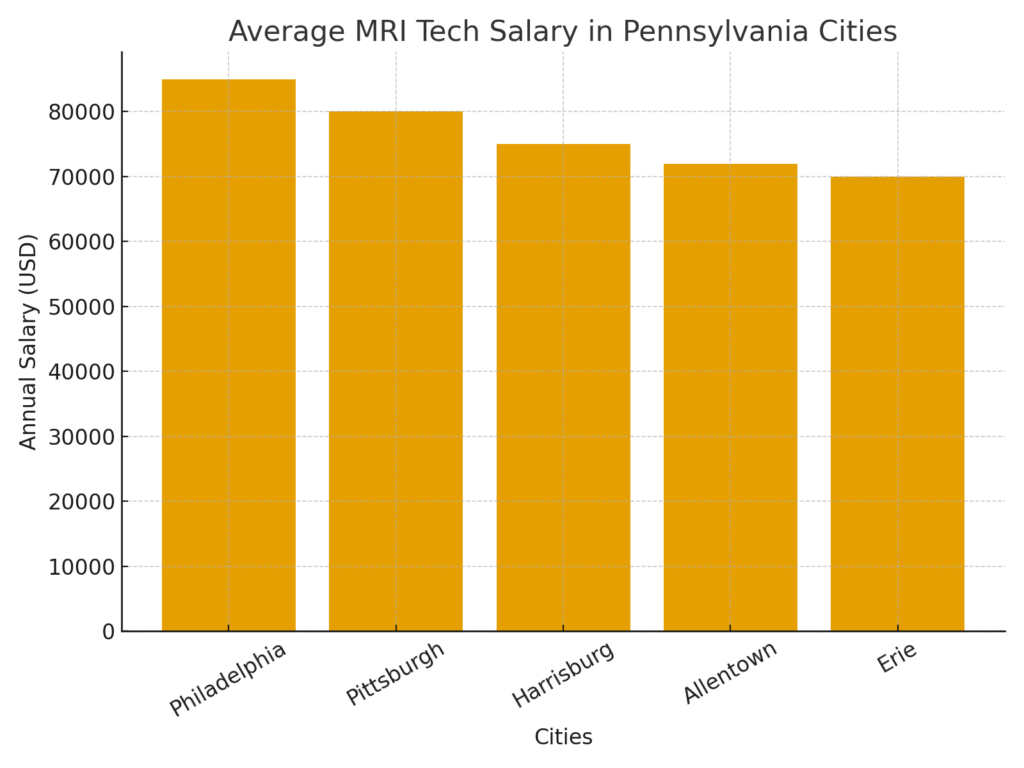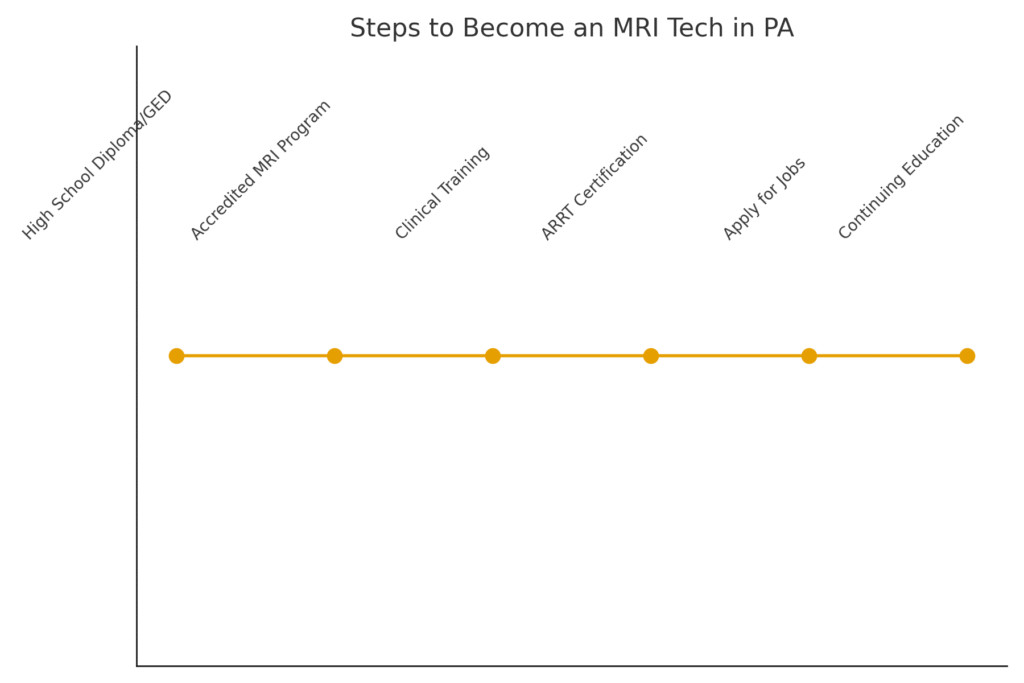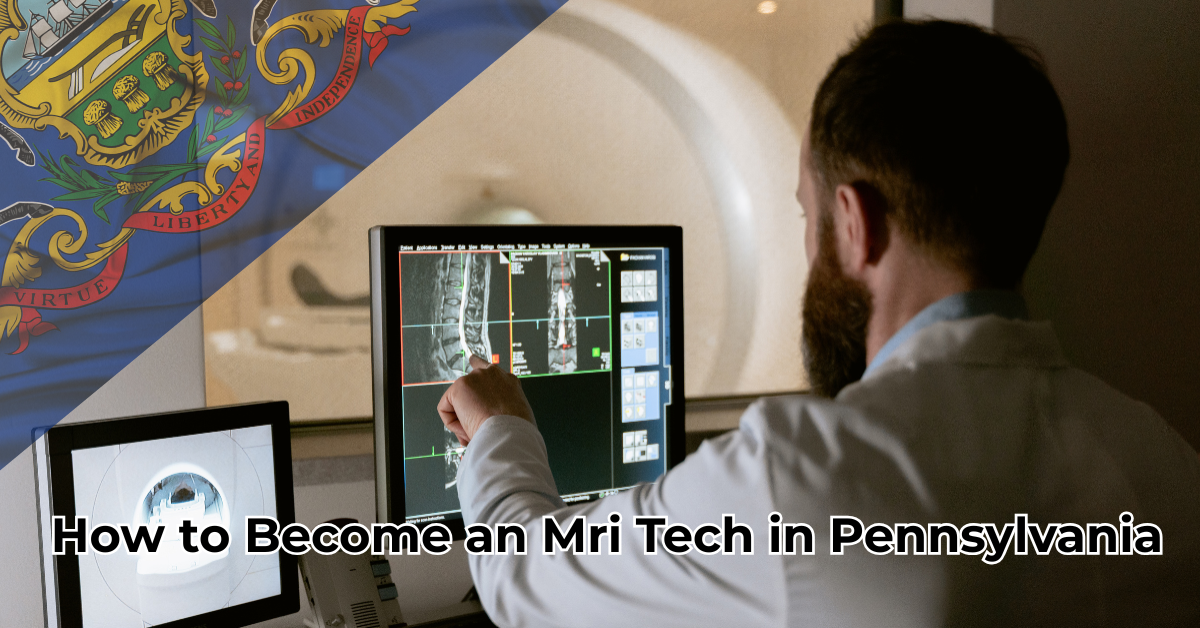MRI technologist is one of the most popular careers in health care in Pennsylvania and is one of the fastest-growing fields in the state. MRI technologists are critical in the health sector because they work on magnetic resonance imaging machines in order to get a clear picture of the internal organs of patients. The images assist in diagnosing and treating different conditions by doctors with a high degree of accuracy.
Being an MRI tech can be a fulfilling option for people who like technology, solving problems, and assisting people. Pennsylvania has a lot to offer, including the best schools and expanding hospital networks that require qualified experts.
But, to venture into this career, one will need to plan, obtain the correct education and the correct certifications. In case you are considering taking this direction, then the steps and requirements will provide a road map that you can follow to the top.
Understanding the Role of an MRI Technologist
Before diving into the educational journey, it’s important to understand what MRI technologists do in their day-to-day work fully. Their main responsibility is to operate MRI scanners, which use powerful magnetic fields and radio waves to produce images of organs, tissues, and bones. These images are critical for diagnosing conditions such as strokes, tumors, spinal injuries, and joint problems.
But the role goes beyond just pressing buttons on a machine. MRI technologists also:
- Prepare patients for scans by explaining the procedure clearly and answering any concerns.
- Position patients correctly on the scanner table to ensure accurate imaging.
- Monitor patient safety, especially because MRIs use strong magnets that can interact with medical devices or metal objects.
- Work closely with radiologists and physicians who analyze the images.
- Keep detailed patient records and maintain imaging equipment.
The career involves effective communication, patience and attention to detail. Patients tend to be nervous about being in the MRI machine, so the calming presence of a tech is essential in addition to technical competence. MRI techs in Pennsylvania are valued as vital healthcare team players who combine high-tech with care.
Education Requirements to Become an MRI Tech in PA
The right education is the first major step in becoming an MRI technologist in Pennsylvania. The lowest level of education needed to begin your career is a high school diploma or a GED, but to progress into this profession, you will need to train in more specialized fields.
The majority of future MRI technologists enter an associate degree program in radiologic technology, medical imaging, or MRI technology. Community colleges, technical schools and universities in Pennsylvania are providing these programs.
During your studies, you will cover both classroom and hands-on learning. Core subjects include anatomy, physiology, patient care, medical terminology, and imaging principles.
You’ll also gain practical experience in clinical settings, working directly with MRI equipment under the guidance of licensed professionals. This combination ensures you not only understand how the machines work but also how to interact effectively with patients.
Some students choose to pursue a bachelor’s degree, which takes longer but may open doors to leadership positions or specialized areas of imaging. Regardless of the path you choose, completing an accredited program is essential, since accreditation guarantees the program meets professional standards and prepares you for certification exams.
Choosing the Right MRI Tech School or Program in Pennsylvania
Selecting the right school can shape your entire career. Pennsylvania offers a wide range of options, from community colleges with affordable tuition to large universities with advanced facilities.
When choosing a program, look for accreditation from the Joint Review Committee on Education in Radiologic Technology (JRCERT) or a similar recognized body. Accreditation ensures employers will respect your education and will qualify you for certification exams.
You should also consider factors like location, cost, class size, and clinical training opportunities. Many schools partner with local hospitals or imaging centers to provide real-world practice, which is crucial for building confidence before entering the workforce. Talking to current students or alums can give you insights into the program’s strengths and weaknesses.
Additionally, some Pennsylvania schools offer evening or online classes, making it easier for working adults or parents to balance their schedules while pursuing this career. Choosing a program that fits your lifestyle and career goals will help you stay motivated and complete your training.
Licensing and Certification Needed for MRI Techs in PA
Once you’ve completed your education, the next step is obtaining the necessary certifications and licenses to work legally in Pennsylvania. The most widely recognized certification is offered by the American Registry of Radiologic Technologists (ARRT).
To qualify, you must graduate from an accredited program and pass the ARRT certification exam. This exam tests your knowledge of imaging procedures, patient care, safety standards, and technical skills.
In Pennsylvania, employers place great emphasis on certification, and most hospitals and imaging centers make it a condition of employment. ARRT certification also qualifies an individual as a professional who is dedicated to the best practices in patient care.
In addition to certification, MRI technologists may need to possess continuing education credits in Pennsylvania to be credentialed. This helps them be conscious of the new changes in imaging technology and safety practices. Other specializations that other MRI technologists are pursuing to widen their professional opportunities include cardiac MRI or breast MRI.
With the appropriate credentials, you not only become more employable but also set yourself up to be successful in the medical imaging profession over the long term.
Skills and Qualities Every Successful MRI Tech Should Have
While education and certification open the door to becoming an MRI technologist, it’s your personal skills and qualities that help you thrive in this role. Being an MRI tech is not just about knowing how to operate advanced machines—it’s also about working closely with people who may be anxious, in pain, or unfamiliar with medical procedures.
Some of the most important skills and traits include:
- Communication skills – MRI techs spend a lot of time explaining procedures and calming patients who may feel nervous about being in the scanner. A friendly and clear communicator makes the experience easier for patients.
- Attention to detail – Positioning a patient incorrectly or overlooking a small adjustment can affect the quality of the scan. Strong focus and precision are crucial for accurate results.
- Technical knowledge – MRI machines are complex, and technologists must be confident in troubleshooting and operating advanced imaging software.
- Compassion and patience – Patients may feel uncomfortable lying still for long periods. A caring and patient attitude goes a long way in building trust.
- Physical stamina – MRI techs spend a lot of time on their feet, assisting patients onto scanning tables and moving equipment.
- Critical thinking – When unusual issues arise during a scan, MRI technologists must quickly evaluate the situation and make the right decision for both safety and image quality.
Employers in Pennsylvania look for these qualities in addition to technical training. Cultivating these soft skills will help you stand out and excel in your career.
Job Outlook and Salary Expectations for MRI Techs in Pennsylvania
The healthcare system in Pennsylvania is growing and developing; therefore, the number of MRI technologists that the healthcare system requires has been increasing. Labor statistics show that the job market for MRI tech will continue to grow in the years into the future.
The state of Pennsylvania is actively recruiting qualified professionals to address the increasing demand for diagnostic imaging in several hospitals, outpatient imaging centers, and specialty clinics.
When it comes to salary, MRI techs in Pennsylvania earn a competitive income compared to many other allied health careers. On average, MRI technologists in the state earn between $65,000 and $85,000 per year, with experienced professionals and those working in large hospital systems often earning more. Factors like location, years of experience, and additional certifications can also influence salary levels.

To illustrate, MRI technicians in Philadelphia or Pittsburgh could earn more because of the demand and cost of living. Smaller towns on the other hand might have slightly reduce pay but a more relaxed work environment. Health insurance, retirement plans, paid time off and continuing education are also benefits in many positions.
The picture is, in general, very optimistic. As the population grows older and more diagnostic imaging approaches are developed, MRI techs will remain a critical part of patient care, and thus a consistent and well-paying career option in Pennsylvania.
Steps to Start Your MRI Tech Career in PA
Now that you understand the role, requirements, and opportunities, let’s put everything into a clear step-by-step roadmap. Here’s how you can begin your MRI tech career in Pennsylvania:

- Earn your high school diploma or GED – Focus on science and math subjects to build a strong foundation.
- Enroll in an accredited MRI or radiologic technology program – Choose a program in Pennsylvania that offers both classroom and clinical training.
- Complete your clinical experience – Gain hands-on training in hospitals or imaging centers, which is essential for developing confidence and practical skills.
- Apply for ARRT certification – Once your program is complete, register for the certification exam and prepare thoroughly. Passing this exam is a major milestone.
- Apply for jobs across Pennsylvania – Start with hospitals, diagnostic centers, or private clinics. Networking during your clinical rotations can often lead to job offers.
- Maintain certification and pursue continuing education – Stay current with new imaging techniques and safety standards by completing required continuing education credits.
- Consider specialization – Over time, you can expand into areas such as cardiac MRI, pediatric imaging, or even leadership roles in radiology departments.
Following these steps not only ensures you meet Pennsylvania’s standards but also sets you up for a long, rewarding career in the medical field.
Conclusion
The path to becoming an MRI technologist in Pennsylvania is one that involves education, skill development, and the ability to care about patients. Whether it be taking accredited courses or getting certifications and actual field experience, each step will bring you a step closer to a well-paid and respected career.
There is a high demand for MRI techs in the state, and this career is particularly attractive due to the job stability, good pay, and meaningful work. MRI technologists do actually improve the world daily, as they help doctors diagnose diseases, and patients to undergo what can be a very stressful experience of medical procedure.
You may be attracted to the field of healthcare, but at the same time, you are fond of working with technology; this profession presents the best solution. With a commitment to education, certification and professional development, you will be assured of entering a profession that can and will offer opportunities, respect and long-term success in Pennsylvania.
FAQs
What is the fastest way to become an MRI tech?
The quickest path is enrolling in an accredited associate degree program in MRI or radiologic technology, which typically takes about two years, followed by ARRT certification.
How much do MRI techs make in PA?
MRI technologists in Pennsylvania usually earn between $65,000 and $85,000 annually, with higher salaries in major cities like Philadelphia and Pittsburgh.

